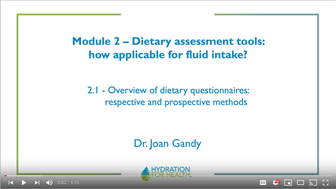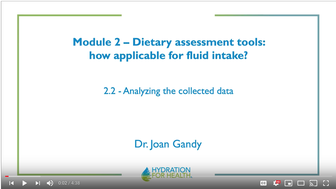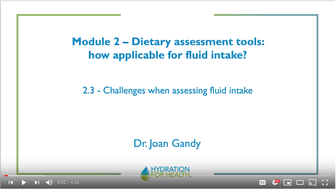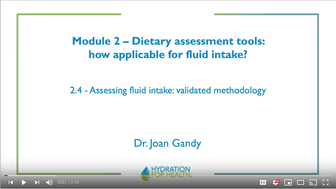2. Dietary assessment tools
Are dietary assessment tools accurate and specific for fluid intake?
Learning outcomes
- It is important to use the dietary assessment tool that is most appropriate for the nutrient/nutrients of interest in that study population.
- Ideally the tool should be validated against an independent criterion measure e.g. doubly labelled water when assessing energy intake or deuterium oxide when assessing water/fluid intake.
- Fluid specific tools that have been validated using an independent criterion measure are now available.
Dietary assessments can be either retrospective, i.e. what has been consumed or prospective i.e. data is recorded during or as close to consumption as possible. In epidemiology the most frequently used retrospective tools are 24 hour recall and food frequency questionnaires ; weighed or estimated food records (diaries) are the most frequently used prospective tool. Each tool will have inherent advantages and limitations and these need to be considered when choosing the tool that is best suited to its planned use (Welch, 2019). The chosen tool needs to be validated, using an independent criterion measure, if one is available, for the nutrient/s being evaluated, ideally in the study population. For example, energy intake can be validated using doubly labelled water (Black et al., 1993).
Until recently water and other fluids were not routinely assessed in population studies. However with increasing recognition of the importance of healthy hydration and its relationship with health and some diseases it is now assessed in many national surveys (Gandy et al., 2016). However, there is evidence that conventional tools do not capture all drinking events (Bardosono et al., 2015; Gandy et al., 2016). Several tools have been developed to specifically assess water and/or fluid intake in diverse populations, for example Ferreira-Pêgo et al., 2016; Jimoh et al., 2015, However a recent systematic review (Grummon et al., 2018) found that neither validity nor reliability were evaluated in most studies of water and/or fluid intake. The first study to validate a fluid intake methodology using an independent criterion measure was published in 2018 (Johnson et al.).
They validated a seven day fluid specific diary total body water turnover using deuterium oxide as the criterion measure and showed that it had both good validity and reliability. This methodology is consistently used in the Liq.in7 study (https://www.hydrationforhealth.com/en/hydration-science/liqin7/) enabling more accurate estimations of total fluid intake and different types of fluids. More recently a water frequency questionnaire, including 17 beverage types, has also been validated against deuterium oxide and demonstrated to have high internal consistency and good reliability (Colburn et al., (2019). This may provide a practical and easy tool for assessing water and fluid intake.
References
Bardosono S, et al. (2015) Total fluid intake assessed with a 7-day fluid record versus a 24-h dietary recall: a crossover study in Indonesian adolescents and adults. Euro J Nutr 54(S2): 17-25.
Colburn et al. (2019) Validation and reliability of a water frequency questionnaire to estimate daily water intake in adults (P13-006-19). Curr Dev Nutr 3(S1):P13-006-19.
Welch A (2019) Dietary assessment. In Manual of Dietetic Practice 6th Edition. Ed J Gandy. Oxford: Wiley-Blackwell.










